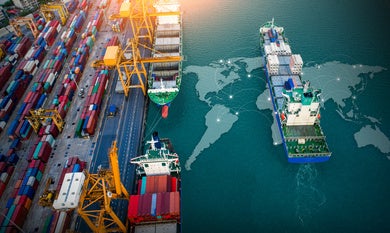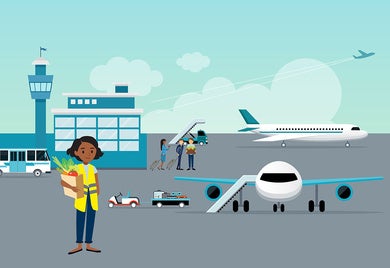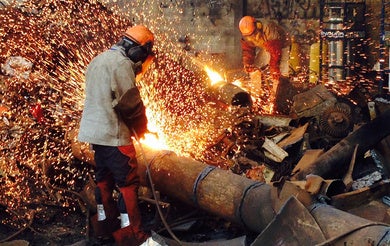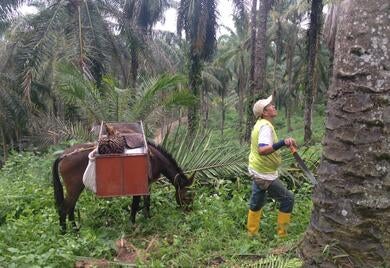
How Trade Finance Boosts Access to Credit for Smaller Businesses and Food Security
Most of the world’s commerce depends on trade finance. However, the global trade finance gap surged to an estimated $2.5 trillion in 2022, widened by the pandemic and ongoing economic and geopolitical uncertainty. Narrowing this gap can have a positive impact on two pressing challenges facing the region: limited access to finance for SMEs and mounting food insecurity.

Shared value takes off
The airport industry is key to the growth of air travel in Latin America. This industry generates 5.2 million jobs that add $167,000 million to the region’s gross domestic product annually. Projections indicate that during the next 20 years this industry will create 99 million jobs around the world. For example in Quito the Mariscal Sucre International Airport was built in 2013 as a private undertaking that, with the IDB Group support, would play a strategic role for this industry in the region. However, modern airports are much more than air transport terminals. They have become “development hubs where other air transport-related or complementary activities converge”, as we have already discussed. A ticket to local food It is increasingly evident that more airport operators and investors realize that environmental and social sustainability has become an investment opportunity that makes financial sense, generating significant benefits for sustainable development. Quiport S.A. — the private operator of the Quito airport — has not been an exception to the rule, and they approached us with a challenge in mind: how to share the value of this development with the local community? The first step was to support the company in conducting a shared value assessment, which allowed us to determine the current and potential resources available. Based on this analysis, Quiport decided to focus on three initiatives to improve both the company and community sustainability by establishing a community-based recycling organization, creating an aviation training center, and supporting the program development of Nuestra Huerta, helping local food producers to be involved in the airport activities. Over the last two years, IDB Invest has supported Nuestra Huerta with business, marketing, and execution trainings, including orientation regarding legal permits for food vending. Thus, the cooperative went from selling fruits and vegetables on a weekly basis to only 100 direct employees of Quiport, to selling more than 36 products to the 7,500 airport workers. Growth has been such that an online platform was created to place orders. Today, this program has benefited not only farmers, but also airport workers who can purchase fruits and vegetables in their workplace. Furthermore, Nuestra Huerta expects to open a store in the airport to sell their product to tourists. Shared value, multiplying effect on profits The Quiport project clearly shows that, in addition to any efforts and work aimed at including the community for the sake of sustainability, one of the most significant outcomes from this project are seen in the company´s positive bottom line. Even though it was not an initial project goal, the upcoming opening of a Nuestra Huerta store will generate a modest return for the airport. Currently, the company is developing recycling initiatives and an aviation training center. The recycling effort will allow the company to save in waste disposal costs, and generate some marginal income from the sale of recyclable materials. As for the training center, customer service will improve at the airport. IDB Invest is committed to working with the private sector to foster sustainable development in Latin America and the Caribbean. We seek investment opportunities that will bring about benefits to communities and companies, as we have done with the shared value assessment for the Quito project. It is not always easy to identify these opportunities, and it is even more challenging to move them forward, but Quiport is a good example that every effort has its reward. So, how do you share the value of your company? Subscribe to receive more content like this! [mc4wp_form]

Development Effectiveness: Adding Value beyond Financing
A new private sector In his recent annual letter to CEOs, Larry Fink, the founder and CEO of the investment firm BlackRock, called on companies to incorporate both profit and purpose into their business strategies. “Society is demanding that companies, both public and private, serve a social purpose. To prosper over time, every company must not only deliver financial performance, but also show how it makes a positive contribution to society.”

Why steel companies are hiring more women
If the entire private sector of Latin America and the Caribbean was one giant company, six out of ten of its employees would be men. And while you could find a somewhat larger number of women in some parts of that company such as Finance, Legal and Human Resources, other areas would almost entirely be made up of men.

Six Takeaways on the Growth of Palm Oil in Latin America
As I have noted before in this space, there are a number of risks and opportunities associated with palm oil. Among other negative impacts, expansion of palm oil plantations drives deforestation in many tropical countries, resulting in enormous carbon emissions. However, palm oil’s high productivity makes it a profitable investment and it has the potential to bring wealth and employment to rural areas.

Is Investment in Palm Oil Certification Worth It?
Palm oil has a terrible reputation. Especially among environmental and social advocates, palm oil is viewed as the crop responsible for a large-scale deforestation, particularly in Southeast Asia. Deforestation of carbon-rich forests leads to greenhouse gas emissions; between 2001 and 2010, palm oil-driven land-use change resulted in an average of 216-268 million tons of CO2 equivalent per year in Indonesia alone. For some perspective, that’s equivalent to the emissions from driving more than 45 million cars over the course of a year! Evidence also suggests labor rights violations, including child labor, at many plantations.